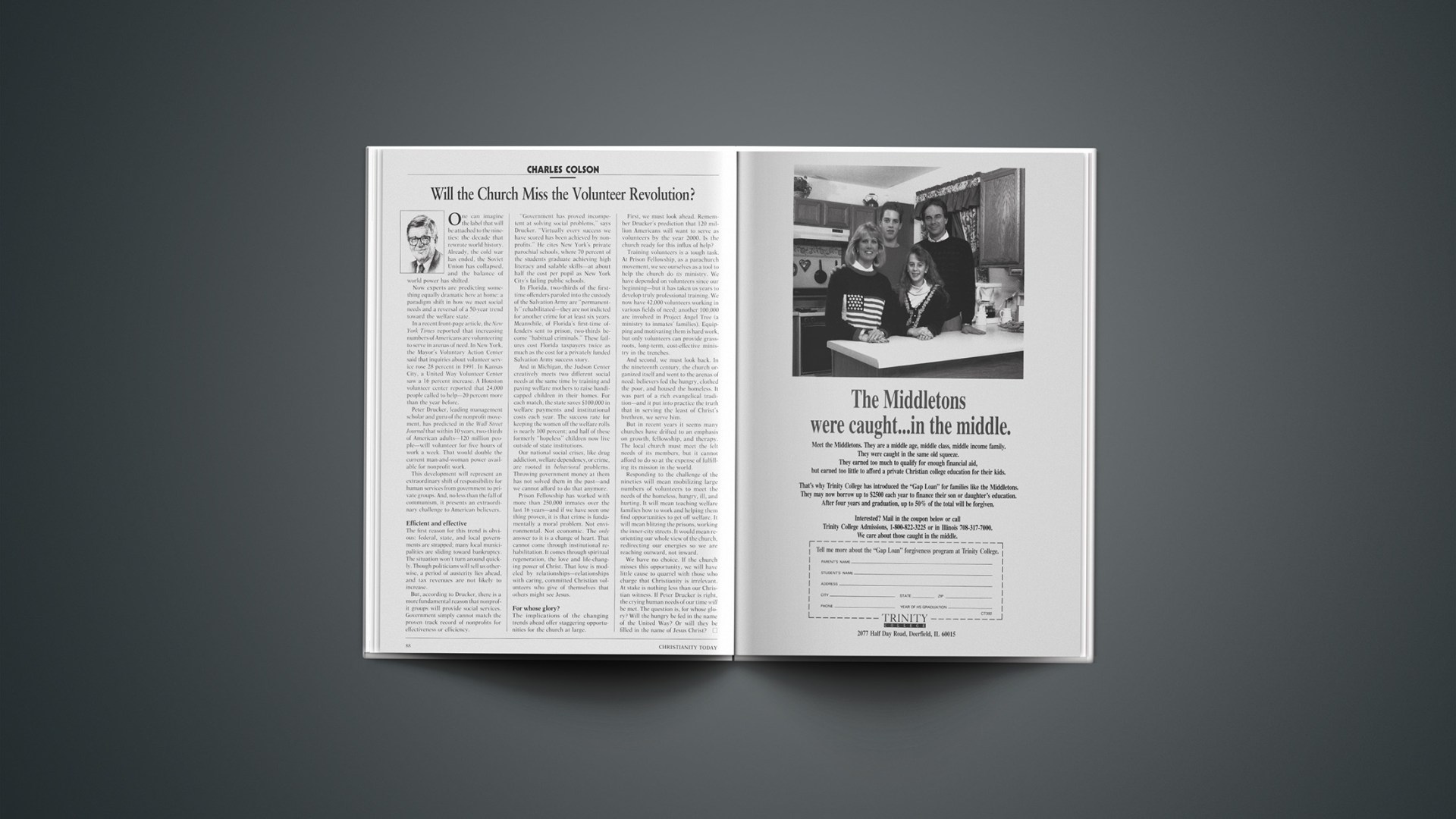One can imagine the label that will be attached to the nineties: the decade that rewrote world history. Already, the cold war has ended, the Soviet Union has collapsed, and the balance of world power has shifted.
Now experts are predicting something equally dramatic here at home: a paradigm shift in how we meet social needs and a reversal of a 50-year trend toward the welfare state.
In a recent front-page article, the New York Times reported that increasing numbers of Americans are volunteering to serve in arenas of need. In New York, the Mayor’s Voluntary Action Center said that inquiries about volunteer service rose 28 percent in 1991. In Kansas City, a United Wav Volunteer Center saw a 16 percent increase. A Houston volunteer center reported that 24,000 people called to help—20 percent more than the year before.
Peter Drucker, leading management scholar and guru of the nonprofit movement, has predicted in the Wall Street Journal that within 10 years, two-thirds of American adults—120 million people—will volunteer for five hours of work a week. That would double the current man-and-woman power available for nonprofit work.
This development will represent an extraordinary shift of responsibility for human services from government to private groups. And, no less than the fall of communism, it presents an extraordinary challenge to American believers.
Efficient And Effective
The first reason for this trend is obvious: federal, state, and local governments are strapped; many local municipalities are sliding toward bankruptcy. The situation won’t turn around quickly. Though politicians will tell us otherwise, a period of austerity lies ahead, and tax revenues are not likely to increase.
But, according to Drucker, there is a more fundamental reason that nonprofit groups will provide social services. Government simply cannot match the proven track record of nonprofits for effectiveness or efficiency.
“Government has proved incompetent at solving social problems,” says Drucker. “Virtually every success we have scored has been achieved bv nonprofits.” He cites New York’s private parochial schools, where 70 percent of the students graduate achieving high literacy and salable skills—at about half the cost per pupil as New York City’s failing public schools.
In Florida, two-thirds of the first-time offenders paroled into the custody of the Salvation Army are “permanently” rehabilitated—they are not indicted for another crime for at least six years. Meanwhile, of Florida’s first-time offenders sent to prison, two-thirds become “habitual criminals.” These failures cost Florida taxpayers twice as much as the cost for a privately funded Salvation Army success story.
And in Michigan, the Judson Center creatively meets two different social needs at the same time by training and paying welfare mothers to raise handicapped children in their homes. For each match, the state saves $100,000 in welfare payments and institutional costs each year. The success rate for keeping the women off the welfare rolls is nearly 100 percent; and half of these formerly “hopeless” children now live outside of state institutions.
Our national social crises, like drug addiction, welfare dependency, or crime, are rooted in behavioral problems. Throwing government money at them has not solved them in the past—and we cannot afford to do that anymore.
Prison Fellowship has worked with more than 250,000 inmates over the last 16 years—and if we have seen one thing proven, it is that crime is fundamentally a moral problem. Not environmental. Not economic. The only answer to it is a change of heart. That cannot come through institutional rehabilitation. It comes through spiritual regeneration, the love and life-changing power of Christ. That love is modeled by relationships—relationships with caring, committed Christian volunteers who give of themselves that others might see Jesus.
For Whose Glory?
The implications of the changing trends ahead offer staggering opportunities for the church at large.
First, we must look ahead. Remember Drucker’s prediction that 120 million Americans will want to serve as volunteers by the year 2000. Is the church ready for this influx of help?
Training volunteers is a tough task. At Prison Fellowship, as a parachurch movement, we see ourselves as a tool to help the church do its ministry. We have depended on volunteers since our beginning—but it has taken us years to develop truly professional training. We now have 42,000 volunteers working in various fields of need; another 100,000 are involved in Project Angel Tree (a ministry to inmates’ families). Equipping and motivating them is hard work, but only volunteers can provide grassroots, long-term, cost-effective ministry in the trenches.
And second, we must look back. In the nineteenth century, the church organized itself and went to the arenas of need: believers fed the hungry, clothed the poor, and housed the homeless. It was part of a rich evangelical tradition—and it put into practice the truth that in serving the least of Christ’s brethren, we serve him.
But in recent years it seems many churches have drifted to an emphasis on growth, fellowship, and therapy. The local church must meet the felt needs of its members, but it cannot afford to do so at the expense of fulfilling its mission in the world.
Responding to the challenge of the nineties will mean mobilizing large numbers of volunteers to meet the needs of the homeless, hungry, ill, and hurting. It will mean teaching welfare families how to work and helping them find opportunities to get off welfare. It will mean blitzing the prisons, working the inner-city streets. It would mean reorienting our whole view of the church, redirecting our energies so we are reaching outward, not inward.
We have no choice. If the church misses this opportunity, we will have little cause to quarrel with those who charge that Christianity is irrelevant. At stake is nothing less than our Christian witness. If Peter Drucker is right, the crying human needs of our time will be met. The question is, for whose glory? Will the hungry be fed in the name of the United Way? Or will they be filled in the name of Jesus Christ?










